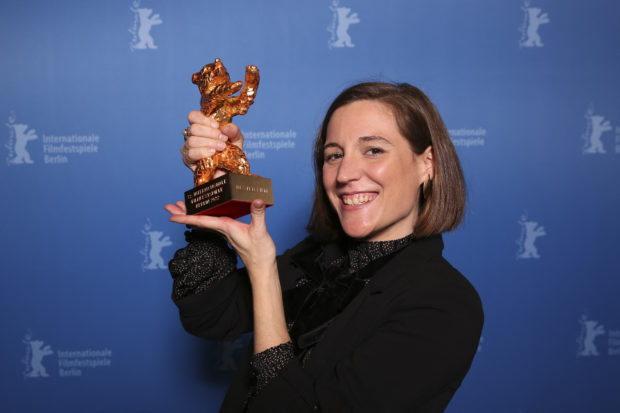How Spanish cinema hit the big time

In this file photo taken on Feb. 16, 2022, Spanish director and screenwriter Carla Simon poses during a photo call after being awarded the Golden Bear for Best Film award for the film “Alcarras” after the awards ceremony of the 72nd Berlinale Film Festival in Berlin. Image: AFP/Ronny Hartmann
With a Golden Bear for Spanish director Carla Simon and four compatriots nominated for Oscars, including superstars Javier Bardem and Penelope Cruz, Spanish cinema has now begun to captivate a global audience.
When Bardem and Cruz, who have been married for over a decade, were both tapped for Oscars, the 53-year-old actor could hardly contain his excitement.
“The fact that (Penelope’s) nomination was for a role in Spanish… seems really extraordinary, even historic in terms of the Spanish brand,” he said in February.
Unlike other countries with a long and distinguished history of cinema, Spain has struggled to establish itself on the international stage.
So far, Luis Bunuel has been the only Spanish director to win the coveted Palme D’Or at Cannes Film Festival for his provocative 1961 feature “Viridiana.”
Article continues after this advertisementBut all that is changing, with Spanish cinema increasingly recognized for its contribution to the silver screen, the most recent being Carla Simon’s triumph at this year’s Berlinale where she took the top prize for “Alcarras” (2022), a Catalan drama about peach farmers.
Article continues after this advertisementAnd according to Variety magazine, Cruz is rumored to be in the running for president of the jury at Cannes, an honor already bestowed upon the legendary Pedro Almodovar, by far Spain’s best-known filmmaker.
Cruz herself is the only Spanish actress ever to win an Oscar, taking home the gong in 2009 for best supporting actress in the Woody Allen comedy “Vicky Cristina Barcelona.”
And if she wins best actress at the Oscars later this month for Almodovar’s “Parallel Mothers,” it will be a coup for a film entirely “Made in Spain,” whose soundtrack has also been nominated for best original score.

Spanish actress Penelope Cruz arrives for the screening of the film “Wasp Network” on Sept. 1, 2019 presented in competition during the 76th Venice Film Festival at Venice Lido. Image: AFP/Vincenzo Pinto
Years of work by film schools
The score was written by Basque composer Alberto Iglesias, who has worked with Almodovar for two decades on 13 of his films. This is the fourth time an Iglesias soundtrack has been nominated for an Oscar.
For him, there is “strong momentum” within Spanish cinema.
“There is an energy… it has to do with the film schools that have been working for a long time to create new filmmakers,” he told Agence France-Presse.
“It has been really difficult for Spanish cinema to cross the threshold and get into these big international festivals,” explains Pilar Martinez-Vasseur, director of the Spanish Film Festival in the French city of Nantes.
Spanish films which have received acclaim abroad are often not identified as such, she said, pointing to the 2001 psychological thriller “The Others” starring Nicole Kidman which was directed by Spain’s Alejandro Amenabar.
“In Spain, we still have the idea that Spanish cinema is bad, that it’s a nest of communists, that filmmakers are pampered, they do nothing and get subsidies,” she said, calling for greater support from the government.
Filmmaking in Spain receives far less state aid than in France, experts say.
Spanish cinema has had to “learn how to break into a globalized ecosystem,” said Beatriz Navas who heads the Institute of Cinematography and Audiovisual Arts (ICAA), which is subsidized by the culture ministry.
“This hasn’t happened overnight because you need some sort of ‘greenhouse’ environment where filmmakers can work with freedom,” she told AFP. “And the ‘incubation time’ needs to be sufficient for these productions to achieve the recognition and prestige they deserve.”
‘Spanish cinema’s best moment’
As well as Cruz, Bardem and Iglesias, Spain also has a fourth horse in the Oscar race in the shape of Alberto Mielgo’s “The Windshield Wiper” which has been nominated for best animated short film.
“This is the best moment for Spanish cinema,” said Jose Luis Rebordinos, director of the prestigious San Sebastian film festival.
“We are making a lot of cinema and audiovisual productions in Spain, as well as for streaming platforms which is bringing a lot of work so Spanish film technicians are getting better and better,” he said.
Spain’s Western-friendly landscapes have drawn Hollywood directors since the 1960s and is becoming an increasingly popular destination for filming series. Netflix, which set up its first European studios in Madrid in 2019, scored huge hits with “Money Heist” and “Elite.”
Last year, the government said it wanted Spain to become Europe’s “audiovisual hub,” pledging to inject 1.6 billion euros to expand the film and TV production sector by 30% by 2025.
“International critics are increasingly focusing on our cinematic output thanks to figures like Almodovar, Javier Bardem and Penelope Cruz,” said Rebordinos.
“They are finding ways to draw more attention to Spanish cinema.” AP/JB
RELATED STORIES:
French films must be ‘more spectacular,’ says top producer
Filmmakers rename ‘Russian Arm’ camera system ‘U-Crane’ after invasion